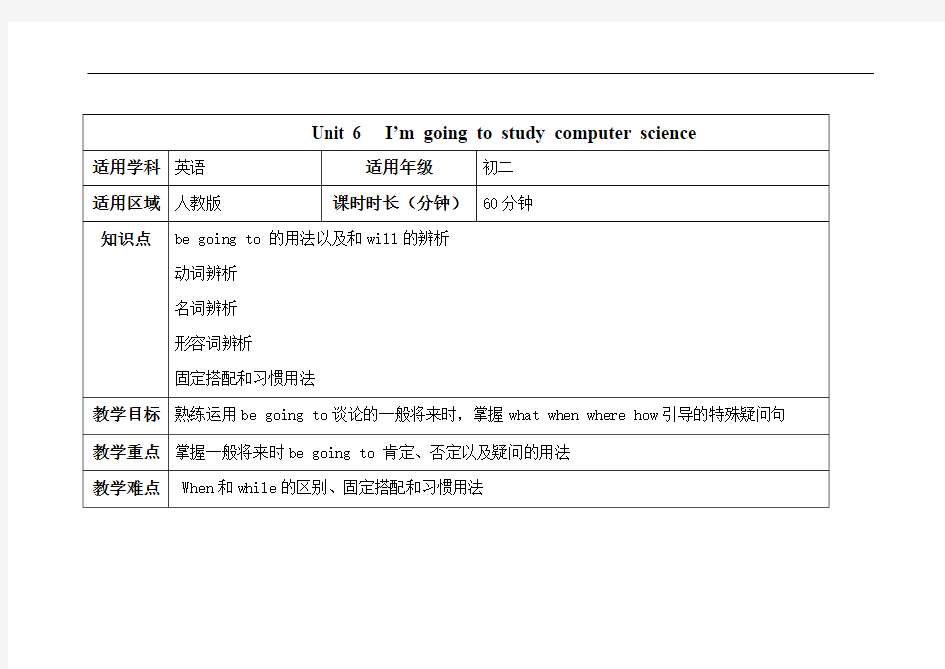
新人教版八年级上册Unit6教案
- 格式:doc
- 大小:108.50 KB
- 文档页数:31


教学过程
知识讲解
考点/易错点1 词组、短语
1、grow up 长大
2、every day每天
3、be sure about对某事确信
4、make sure 确信/有把握
5、send…to…把…发送到…/把…寄…
6、be able to 能/能够
7、the meaning of …的意思/含义
8、different kinds of 不同种类的9、in common通常
10、at the beginning of 在…开始的时候
11、write down写下/记下
12、have to do with必须处理某事
13、take up 开始从事/着手处理/接受
14、hardly ever 几乎不
15、too…to…太而不能
考点/易错点2 重要句子
What do you want to be when you grow up? I want to be an engineer.
How are you going to do that? I’m g oing to study math really hard.
Where are you going to work? I’m going to move to Shanghai.
When are you going to start? I’m going to start when I finish high school and college.
考点/易错点3习惯用法、搭配want to do sth. 想做某事
be going to + 动词原形:将要做某事practice doing sth. 练习做某事
keep on doing sth.继续做某事
learn to do sth. 学会做某事
finish doing sth做完某事
promise to do sth.答应做某事
help sb. to do sth.帮助某人做某事remember to do sth. 记住要做某事agree to do sth.同意做某事
love to do sth.喜欢做某事
be going to 的用法
考点/易错点4
1)be going to + 动词原形——表示将来的打算、计划或安排。常与表示将来的tomorrow, next year等时间状语或when 引导的时间状语从句连用。各种句式变换都借助be 动词完成,be随主语有am, is, are 的变换,going to 后接动词原形。
肯定句:主语+ be going to + 动词原形+ 其他。He is going to take the bus there.
否定句:主语+ be not going to + 动词原形+ 其他I’m not going to see my friends this weekend.
一般疑问句:Be + 主语+ going to + 动词原形+ 其他
肯定回答:Yes, 主语+ be. 否定回答:No, 主语+ be not.
例:Are you going to see your friends this weekend? Yes ,I am. / No, I’m not.
特殊疑问句:疑问词+ be + 主语+ going to + 动词原形+ 其他?
例:What is he going to do this weekend? When are you going to see your friends?
2) 如果表示计划去某地,可直接用be going to + 地点
We are going to Beijing for a holiday.
3) 表示位置移动的动词,如go , come, leave 等常用进行时表示将来。
The bus is coming. My aunt is leaving for Beijing next week.
4) be going to 与will 的区别:
be going to和will 的用法虽然都表示将来发生动作或情况,但它们的用法是有区别的。
(1)be going to主要用于:
1、表示事先经过考虑、安排好打算、计划要做的事情。
E.g. What are you going to do today? 今天你们打算做什么?
Dad and I are going to watch an opera this afternoon. 今天下午我和爸爸打算去看歌剧。
She’s going to play the piano. 她打算弹钢琴。
2、表示根据目前某种迹象判断,某事非常有可能发生。
E.g. Look! There come the dark clouds. It is going to rain. 瞧!乌云密集,天要下雨。
I am afraid I am going to have a cold. 恐怕我要患重感冒。
(2) will主要用于在以下几个方面:
1、表示单纯的未来“将要”通用各个人称。
eg: They will go to visit the factory tomorrow. 明天他们将去工厂参观。
I’l l come with Wang Bing, Liu Tao and Yang Ling. 我将和王兵、刘涛、杨玲一起来。
2、表示不以人的意志为转移的自然发展的未来的事。
eg: Today is Saturday. Tomorrow will be Sunday.
今天是星期六。明天是(将)是星期日。
He will be thirty years old this time next year.
明年这个时候他就(将)三十岁。
3、问对方是否愿意做某事或表示客气地邀请或命令。
eg: Will you please turn on the radio? 请打开收音机好吗?
Will you go to the zoo with me? 你和我一起去动物园好吗?